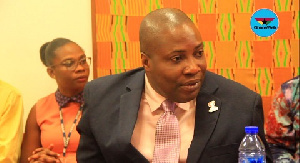Health News of Friday, 29 October 2021
Source: GNA
We need comprehensive education to reduce HIV/AIDS - Dr. Ayisi Addo
Dr Stephen Ayisi Addo, Programme Manager,National AIDS/STI Control Programme (NACP) has reminded Ghanaians of the need for a comprehensive education to control the HIV and AIDS epidemic.
He said people had forgotten that HIV still existed and thereby relaxing, but
“I want to remind that HIV and AIDS continue to be major health and economic problems that affect our social life”.
Dr. Ayisi Addo stated this at the seventh Ghana News Agency (GNA) Tema Regional Office Stakeholder Engagement and Workers Appreciation Day” seminar, which is a platform rolled-out for state and non-state actors to address national issues.
According to him, the National AIDS/STI Control Programme had observed in the 2020 HIV Sentinel Survey report that persons cohabiting had the highest prevalence of 3.5 per cent, while singles accounted for 3.1 per cent and married people 2.5 per cent amongst antenatal clients.
He explained that education had helped most of the pregnant patients and now they were giving birth to negative children which was good and hence more education would help to eradicate HIV in the country.
Dr. Ayisi Addo said there was a need to empower young girls through education to prevent HIV transmission considering the recent records of new infections, stressing that adolescent clubs created for the girls to reach out to them through empowerment on their rights and assertiveness to ward off abusers.
Mr. Francis Ameyibor, Tema Regional Manager of GNA said the stakeholder engagement which comes on every month was a progressive media caucus platform created to give the opportunity to both state and non-state stakeholders to interact with journalists and address national issues.
He said modern journalism practices demanded a comprehensive dynamic approach to issues that affected society, through which the media provided a platform for proactive engagement and exchange of ideas towards shaping national development.
It is therefore essential for the media to champion national discussions ‘to carry everyone along the discourse, the people in the market place, the rural area, the communities and those literate or illiterate, let’s not leave anyone out.’
Entertainment










